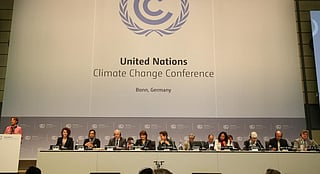
United Nations Framework Convention on Climate Change (UNFCCC) Executive Secretary, Christiana Figueres has called for there to be coherence inside and outside of her organisation.
Figueres was among a number of speakers who spoke at the stocktake event held on May 21, halfway through the Bonn Climate Talks.
Speaking in context of the amount of work that lay ahead before various climate organisations, Figures said that Parties are challenged by their own success. She urged the necessity of coherence not only among the three subsidiary bodies of the UNFCCC including the Subsidiary Body for Implementation (SBI), Subsidiary Body for Scientific and Technological Advice (SBSTA) and Ad Hoc Working Group on the Paris Agreement (APA) but also to work in coordination with Sustainable Development Goals (SDGs), NASDAQ platform, Sendai framework and Addis Ababa for total and comprehensive climate actions.
The stocktaking event was one of two held on May 21 to assess progress and seek parties views on the way forward. It was convened by the current President of CoP21, French Minister of Ecology, Sustainable Development and Energy, Segol ne Royal, and Hakima El Haite, on behalf of the incoming Presidency of CoP22/CMP12 to be held at Marrakesh, Morocco. Other speakers included the chairs of the SBI and SBSTA and Laurence Tubjana from the CoP presidency.
Royal expressed happiness at observing that a positive mood continued in the three subsidiary bodies. She also appreciated the Parties' efforts at reaching consensus on issues and their full support and cooperation. She said that it was essential to assess whether progress had been made.
El Haite, while speaking on behalf of the Moroccan Presidency, said that Marrakesh had huge expectations from CoP 22. We want it to be an action CoP, she said.
The three subsidiary bodies, the SBI and SBSTA and the APA made their statements on the progress achieved. While SBSTA was pleased to report that it continued to provide scientific and technological advice to Parties, it reported that it had held a workshop on matters related to agriculture and a special event on how advising the Intergovernmental Panel on Climate Change (IPCC) can inform global stocktake. It also mentioned that it was working in coordination with SBI on joint matters of response measures and review. On the joint matter of global stocktake, it was closely working with APA Co-Chairs.
SBI Chairman Thomas reported that his organisation was committed to empowering observers, creating a platform for transparency and also include social partners and gender inclusiveness in its mandate. It also mentioned that pre-2020 actions to address climate change were critical and effective tools were required so that such actions were taken forward. He remarked that this session is rich in additional mandated events and to encourage discussions on cross cutting issues. The mitigation and adaptation technical meeting that SBI organized also recognised that pre-2020 actions were important. On sustainable climate solutions, he remarked that climate empowerment is an implementation-oriented exercise and would not be possible to sustain if gender actions are not taken into account.
The APA was happy to report that it had adopted a revised agenda and the addition of adaptation registry and adaptation communication in it was done in communication with the SBI Chair after intense deliberations with the Parties. APA co-chair Sara Bashaan also pointed out that APA was committed to balance, transparency and inclusiveness.
The Adaptation Committee and Least Developed Countries Expert Group (LEG) reported their progress of holding meetings and technical examination process. Both groups, it was reported, were working in coordination. The Special Committee on Finance (SCF) reiterated that it would serve the Paris agreement under the mandate given to it. It would continue to provide coherency in delivery of finance, mobilise funds and provide Measuring, Reporting and Verification (MRV) of support provided to the developing countries. The review of the work of SCF would be made in Marrakesh.
The Executive Committee (Ex-Com) of the Warsaw International Mechanism on Loss and damage (WIM) reported on the progress made on its mandate to establish a clearinghouse for risk transfer that serves as a repository for information on insurance and risk transfer, in order to facilitate the efforts of Parties to develop and implement comprehensive risk management strategies and establish a task force to complement, draw upon the work of and involve, as appropriate, existing bodies and expert groups under the Convention including the Adaptation Committee and the Least Developed Countries Expert Group, as well as relevant organisations and expert bodies outside the Convention, to develop recommendations for integrated approaches to avert, minimise and address displacement related to the adverse impacts of climate change . For both these mandates, work was underway. The draft committee for clear-house was established and the task force for the second mandate had developed its terms of reference (ToR).
The representative of the GCF declared to move from resource mobilisation to implementation . He highlighted that currently, projects worth US$ 168 million were happening. He urged countries not to wait and not to hold back on their commitments as the GCF is waiting for funds from Parties.
The IPCC representative reported to the CoP president that it had already started work on its special report to be brought out in September 2018 and also to align the report with the process of global stocktake.
The Global Environment Facility (GEF) reported that it was closely working with the Parties on the provision of finance and advancing the work of the countries towards implementation of their INDCs. It also intends to work on the quality enhancement of the INDCs of countries and also supports enhanced transparency work and technology work.
Parties, while giving their statements, urged on continued transparency and inclusiveness and balanced treatment to be given on all issues.